
Greenpeace is an independent global campaigning network, founded in Canada in 1971 by a group of environmental activists. Greenpeace states its goal is to "ensure the ability of the Earth to nurture life in all its diversity" and focuses its campaigning on worldwide issues such as climate change, deforestation, overfishing, commercial whaling, genetic engineering, anti-war and anti-nuclear issues. It uses direct action, advocacy, research, and ecotage to achieve its goals.

The Free Trade Area of the Americas was a proposed agreement to eliminate or reduce the trade barriers among all countries in the Americas, excluding Cuba. Negotiations to establish the FTAA ended in failure, however, with all parties unable to reach an agreement by the 2005 deadline they had set for themselves.

Nestlé S.A. is a Swiss multinational food and drink processing conglomerate corporation headquartered in Vevey, Switzerland. It has been the largest publicly held food company in the world, measured by revenue and other metrics, since 2014. It ranked No. 64 on the Fortune Global 500 in 2017. In 2023, the company was ranked 50th in the Forbes Global 2000.
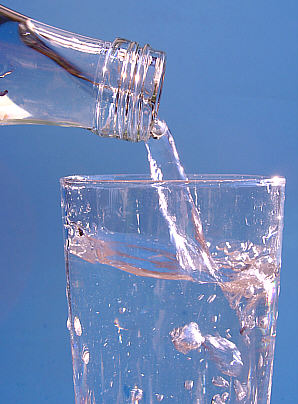
Bottled water is drinking water packaged in plastic or glass water bottles. Bottled water may be carbonated or not, with packaging sizes ranging from small single serving bottles to large carboys for water coolers. The consumption of bottled water is influenced by factors such as convenience, taste, perceived safety, and concerns over the quality of municipal tap water. Concerns about the environmental impact of bottled water, including the production and disposal of plastic bottles, have led to calls for more sustainable practices in the industry.

Perrier is a French brand of natural bottled mineral water obtained at its source in Vergèze, located in the Gard département. Perrier was part of the Perrier Vittel Group SA, which became Nestlé Waters France after the acquisition of the company by Nestlé in 1992. Perrier is known for its carbonation and its distinctive green bottle.

Patrick Cyril "Sid" Ryan is a Canadian labour union leader and politician. Ryan is the former president of the Ontario Federation of Labour.

Peter S. Julian is a Canadian Member of Parliament for the New Democratic Party (NDP), representing the riding of New Westminster—Burnaby. He was first elected in 2004.

Maude Victoria Barlow is a Canadian author and activist. She is a founding member and former board chair of the Council of Canadians, a citizens' advocacy organization with members and chapters across Canada. She is also the co-founder of the Blue Planet Project, which works internationally for the human right to water. Barlow chairs the board of Washington-based Food & Water Watch, serves on the Board of Advisors to the Global Alliance on the Rights of Nature, was a founding member of the San Francisco–based International Forum on Globalization, and was a Councillor with the Hamburg-based World Future Council. She is the Chancellor of Brescia University College at Western University. In 2008/2009, was Senior Advisor on Water to the 63rd President of the United Nations General Assembly.

Beverage Partners Worldwide was a joint venture between The Coca-Cola Company and Nestlé with headquarters in Zurich, Switzerland. The venture was originally started in 1991 but was dissolved in 1994 due to organizational and distribution disputes. It was resurrected in 2001 before dissolving permanently in 2018. Their main products were Nescafé and Nestea.
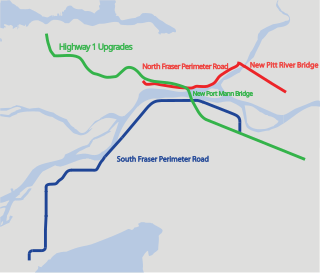
The Gateway Program is a C$3.0 billion regional transportation project for Metro Vancouver and surrounding areas that is being managed by the British Columbia Ministry of Transportation. The ministry introduced the Gateway Program on January 31, 2006, as a means to address growing congestion and reduce travel times. The bulk of the construction took place from 2006 to 2014 and saw the completion of the Pitt River Bridge, the Port Mann Bridge, improvements to Highway 1 and construction of the South Fraser Perimeter Road.
A hot stain is a region of the world where safe drinking water has been depleted. The term may have been coined by Goldman Environmental Prize winning hydrologist Michal Kravcik. Hot stains can be found on every continent, except for Antarctica. The biggest reason for a hot stain to develop is population pressure. As the population grows, water demand increases. Although the earth is covered in 97% water, only 1% of that water is available for human consumption. Hot stains can cause great harm to a regions agricultural ability and can lead to food scarcity, famine, and even the abandonment of the region.

Water on the Table is a Canadian documentary film directed, produced and written by filmmaker Liz Marshall. The film explores Canada's relationship to its freshwater resources and features Canadian activist Maude Barlow in her pursuit to protect water from privatization. Counterbalancing Barlow's views are those of policy and economic experts who assert that water is a resource and a commodity like any other.

Nestlé Waters is a Swiss multinational bottled water division of Nestlé. It was founded in 1992.

BlueTriton Brands, Inc. is an American beverage company based in Stamford, Connecticut. A former subsidiary of Nestlé, it was known between 2002 and 2021 as Nestlé Waters North America, Inc. and operated as the North American business unit of Nestlé Waters. It produces and distributes numerous brands of bottled water across North America including Arrowhead Water, Deer Park Spring Water, Ice Mountain, Pure Life, Splash, Saratoga, Ozarka, Poland Spring, and Zephyrhills.
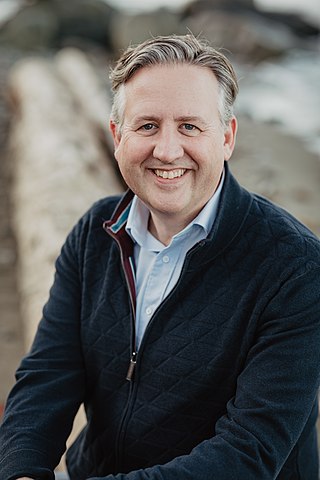
Edward Charles Kennedy Stewart is a Canadian academic administrator and politician who served as the 40th mayor of Vancouver from 2018 to 2022. He previously was the member of Parliament (MP) for the riding of Burnaby—Douglas (2011–2015) and Burnaby South (2015–2018), serving in the House of Commons as a member of the New Democratic Party (NDP) caucus.

Brigette DePape is a Canadian activist from Winnipeg, Manitoba, who was a Canadian Senate page when she disrupted the throne speech in 2011 with a silent demonstration in the Senate of Canada. She has protested other events as well, causing her to be arrested in 2014.

Lynne Quarmby is a Canadian scientist, activist, and politician. She is a professor and Chair of the Department of Molecular Biology and Biochemistry at Simon Fraser University in Burnaby, British Columbia. She was a candidate for the Green Party of Canada in Burnaby North—Seymour in the 2015 federal election, and is the Green Party of Canada's Science Policy Critic.
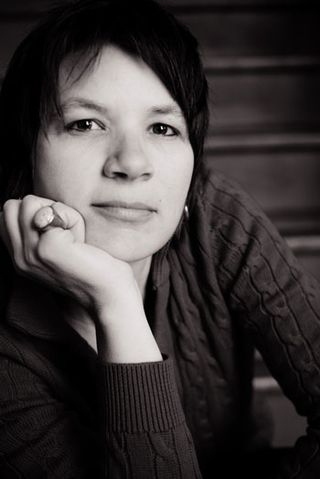
Liz Marshall is a Canadian filmmaker based in Toronto. Since the 1990s, she has directed and produced independent projects and been part of film and television teams, creating broadcast, theatrical, campaign and cross-platform documentaries shot around the world. Marshall's feature length documentaries largely focus on social justice and environmental themes through strong characters. She is known for The Ghosts in Our Machine and for Water on the Table, for which she also produced impact and engagement campaigns, and attended many global events as a public speaker. Water on the Table features water rights activist, author and public figure Maude Barlow. The Ghosts in Our Machine features animal rights activist, photojournalist and author Jo-Anne McArthur.
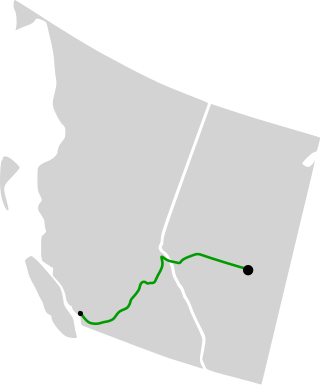
The Trans Mountain Pipeline System, or simply the Trans Mountain Pipeline (TMPL), is a multiple product pipeline system that carries crude and refined products from Edmonton, Alberta, to the coast of British Columbia, Canada.

Anne Kang is a Taiwanese-born Canadian politician who has represented the electoral district of Burnaby-Deer Lake in the Legislative Assembly of British Columbia since 2017. A member of the British Columbia New Democratic Party caucus, she has served in the cabinet of British Columbia since 2020, currently as Minister of Post-Secondary Education and Future Skills. From 2022 to 2024, she was Minister of Municipal Affairs. Prior to her election as Member of the Legislative Assembly (MLA), Kang served as a city councillor in Burnaby for three terms.


















